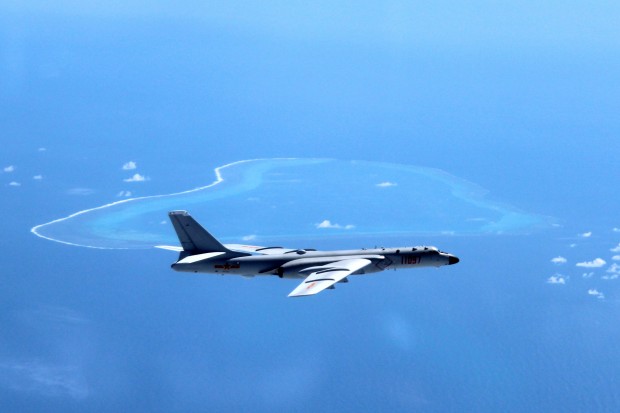China’s historic rights over South China Sea islands irrefutable: experts

In this undated photo released by Xinhua News Agency, a Chinese H-6K bomber patrols the islands and reefs in the South China Sea. China is closing off a part of the South China Sea for military exercises this week, the government said Monday, July 18, 2016, days after an international tribunal ruled against Beijing’s claim to ownership of virtually the entire strategic waterway. (Liu Rui/Xinhua via AP)
Chen Shangwen – People’s Daily
China’s irrefutable territorial sovereignty and maritime interests and rights over the South China Sea will by no means be negated by the so-called ruling issued by an arbitration tribunal, noted a group of experts, refuting the award as illegal and invalid.
Backed by ample historical and legal evidence, China’s sovereignty and rights in the South China Sea have been formed throughout the course of over 2,000 years.
Experts noted that the award rendered by the tribunal on July 12 is illegal and invalid in every sense. The real motive of the arbitration, indeed a political provocation under legal pretext, is to deny China’s sovereignty and maritime interests and rights.
Li Guoqiang, a deputy director general of Institute of Chinese Borderland Studies under the Chinese Academy of Social Sciences (CASS), told the People’s Daily that the tribunal knows little about the history of the South China Sea though they frequently mentioned it in their verdict.
What they did was an instance of the pure neglect of history and unreasonable denial of China’s interests, he said. “Abundant historical literature in the past two millenniums has proved that China is the first to discover, name and peacefully utilize islands and waters in the South China Sea,” Li explained.
There are proofs that the South China Sea was part of China’s territory prior to the founding of the neighboring countries in the region, Li said, adding that at that time, the waters were Chinese people’s fishing grounds.
China resolutely safeguards its sovereignty and maritime interests and rights in the South China Sea, said Hu Dekun, dean of China Institute of Boundary and Ocean Studies of Wuhan University.
According to Hu, Japan occupied Xisha and Nansha islands back in 1939. Four years later, at the Cairo Conference, the Chinese government requested to recover all the stolen territories, which was agreed by the US and the UK.
“Both Cairo Declaration and Potsdam Proclamation serve as legal basis and solemn pledge of the international community for China to reclaim its islands in the South China Sea,” Hu told the People’s Daily.
China’s sovereignty over these islands has been widely recognized by the international community. After World War II, China recovered the islands in the South China Sea and resumed exercise of sovereignty. Many countries acknowledged that these islands are China’s territory.
Li said that neighboring countries in the South China Sea, including Vietnam and the Philippines, never raised objections over China’s sovereignty of the islands as well as the dash line in the region along the course of history.
Abundant foreign documents, literature and maps have also shown that the Xisha and Nansha islands are China’s territory, Li added.
Professor John Anthony Carty of Tsinghua University pointed out that documents from the UK, France, Japan and many other countries also proved the millennium-long existence of Chinese people in the South China Sea.
“These are crucial evidences,” he noted.
























































